- Home
- Roberto Saviano
Savage Kiss Page 4
Savage Kiss Read online
Page 4
They want to bury Don Vittorio alive, he thought to himself. He’d stopped at a safe distance, outside a café with an array of empty tables. The day had lost its beauty, even the breeze that had sprung up earlier had waned to little or nothing. He called Aucelluzzo: if he knew how to get out of Ponticelli, then he certainly must know how to get back in there. Five minutes later he heard the unmistakable sound of Aucelluzzo’s scooter. He saw the man come buzzing out of the curve, zipping along at top speed, ears practically grazing the ground. The scooter screeched to a halt right in front of him, and Aucelluzzo still hadn’t set both feet on the pavement when he was already pulling up his T-shirt to proudly display his new tattoo. He’d had four bullet holes inked on his skinny pale chest.
“Ua’, that’s too great, exactly like Wolverine!” Nicolas exclaimed, a little bit to flatter him, but almost as much because he really thought so.
As soon as Aucelluzzo pulled his T-shirt back down, he set off on his usual litany of woes. Nicolas couldn’t just call Aucelluzzo whenever he pleased, his life was already a shitstorm, he had to peddle drugs for pennies, and now he had to deal with Micione’s guards, too.
“Maraja,” he said at last, “I’m the only one who can come and go, I move like the wind.”
Nicolas gently laid his fist on the other man’s shoulder.
“Why, you think I don’t know that? That’s why I called you, Aucellu’. I need your superpowers.”
Aucelluzzo puffed out his chest, and without a word he took off at speed, followed by Nicolas. They turned into a large parking lot just off the A3, and arrived at a cemetery of rusty trailers, and then at a sheet-metal barrier that bordered Via Mastellone: the entrance to Ponticelli. Aucelluzzo went over to a panel that was dangling loose and removed it without effort. He threw it to the ground, kicking up a cloud of dust: “Now you can get through, Maraja.” Nicolas gave him a half bow and sped off.
The zone of Ponticelli was, if possible, more desolate still. All the life that remained in it was drying up. The few shops had their roller blinds down and defiled with graffiti, and there was practically no one in sight on the streets.
A nuclear war, Nicolas said to himself. A war of asphyxiation, an extended siege, the sole objective of which was to drain L’Arcangelo’s resources, driving him into famine, paralysis, utter starvation. Sooner or later, Micione would win his victory, everyone else believed.
Everyone but Maraja.
He parked under the portico of the apartment building where Don Vittorio L’Arcangelo had his cell-like apartment. He glanced up to see if he could spot a pair of eyes peering out from under the lowered wooden roller blinds: the eyes of ’o Cicognone, Don Vittorio’s factotum, and then he knocked on the door of the schoolteacher, Professoressa Cicatello. She answered wearing the usual stained apron. Nicolas greeted her with the most courteous “buongiorno” he could muster, but then he ruined everything by blurting out an oath—“mannagi’a morte”—because he had just remembered the porcelain ballerina he’d left downstairs in the underseat compartment of his scooter. He turned and ran downstairs to get it. When he got back upstairs, Professoressa Cicatello was still standing there, and Nicolas placed it in her hand with: “Payment in advance, signo’, otherwise I’m sure to forget it.” He’d already run into too many unforeseen obstacles that day to waste time on conventional chitchat, and after all, he knew the way by heart. He walked past the young kids Professoressa Cicatello was tutoring and reached the kitchen: up the ladder, reach the trapdoor, three well-aimed blows with the broom handle on the ceiling. ’O Cicognone opened the trapdoor, giving him a fleeting glance, because in the meantime L’Arcangelo was shouting: “Ua’, che chiavata! Che chiavata!” I’m getting fucked here!
Nicolas found them sitting in front of an ISS Pro Evolution video game. L’Arcangelo was holding the joypad as if it were a TV remote control, with just one hand, and he was waving it in front of the television screen as if that would allow him to steer the players. “What the fuck!” he kept saying. He’d jumped to his feet, on edge, and Nicolas noticed that the jeans he was wearing were at least a couple of sizes too big. A T-shirt that must once have been bright red hung torn on one side, while the pullover draped over his shoulders, hanging slightly askew, was pilling and covered with lint balls. Don Vitto’ has lint balls, Nicolas thought to himself, and that image cut the tension that had seized him the minute he’d climbed up into the apartment. Today he was risking a chunk of his future, and he was going to have to face off with that man who reeked of filth and old age. Who reeked of death.
“How the hell do you do it, though,” Don Vittorio was saying, “how the hell do you have any fun with this piece of shit?” And then he slapped his hand down on the joypad and silenced the PlayStation. “Cicogno’,” he said, “go make an espresso, ja’, we have an important guest.”
“Sure, Cinderfella will make you an espresso,”’o Cicognone muttered, and vanished into the kitchen. As soon as they were alone, Nicolas made his business report to L’Arcangelo, telling him that everything was going pretty well, leaning hard on that “pretty well,” and then pulled a couple of wads of cash out of his pockets. “This is the cut from the Grimaldi clan.”
L’Arcangelo hefted the wads of bills for a short while, uncertainly, his eyes half closed.
“Don Vitto’, wait, what are you saying, don’t you count the money?”
“There are two kinds of men in this world. The kind that counts money, and the kind that weighs it, Nicolas. The ones who count money don’t have any. The ones who weigh it have plenty. You know how much a billion lire weighs?”
“A billion what?”
“A billion lire, asshole! The money people used before the euro. Thirteen kilos, four hundred grams.”
“Fuck. And how much do you figure I just gave you?”
“More or less fifty thousand euros,” he replied promptly. “Nico’, if I was selling it, I would have made twice as much. You and your fucking Google method…”
Nicolas took the slight without complaining, there was no point in digging up that old argument, he was there for a specific reason. He knew what he wanted to ask, but he didn’t know when, and if the old man was in a bad mood, that would ruin everything. So he tried to sound him out: “Don Vitto’, don’t you ever have a woman come to see you?”
“No, because I lost your mother’s phone number. Why would you ask me a question like that? What, have we eaten from the same plate?” the old man replied with a hint of surprise, but they were words uttered with a smile.
“No, Don Vitto’, but I’m seriously worried that you, with Cinderfella over there”—and he jutted his chin in the direction of the kitchen—“what with one espresso and another, you and him, him and you, maybe the two of you … you know what I’m saying, I mean maybe you still get it up.”
Don Vittorio’s smile didn’t waver: “In fact, I have to try and remember if I ever fucked your mother, a guagliona from around Forcella, eighteen years ago … maybe you’re actually my son.”
“Eh, I only wish, Don Vittorio.”
L’Arcangelo took pleasure in that aside and, with a smile still on his face, finally invited Nicolas to take a seat. “So tell me, Nico’, you don’t keep the weapons I gave you in the lair on Vicolo dei Carbonari, do you?”
“And how do you know about the lair?”
“I know all about you. I created you. The apple never falls far from the tree. You’re my apple.”
“This thing with the apple sounds a little gay, if you don’t mind my saying so, Don Vitto’. I’m Adam, not Eve, you know.”
“Madonna, what a rude thing you are … So where did you put these weapons, anyway?”
“Where they’ll be safe.”
“No, but exactly where, tell me that.” L’Arcangelo had made an investment. It was his entrepreneurial right to make sure things were being done right. “You might trust the children you work with, but I don’t, or not as much as you, anyway. They never caught me with anything, n
ot in the past twenty years.”
“They’re in the safekeeping of a caregiver, in Gianturco. Safer than that there’s only the carabinieri barracks.”
“Good job. And good job your paranza is doing, you’ve got your system chugging along nicely. You’re becoming the prince of Naples, bravo.”
Nicolas cocked an eyebrow. “Ua’, Don Vitto’, if you talk like that you’re making a mistake, don’t you know what Maraja means in Sanskrit?” He spoke carefully, pausing briefly before uttering that last word, almost as if getting a running start before uttering that difficult foreign term. “It means great king. And you could bet your bottom dollar that I wasn’t born to be a prince; I’m the king.”
“Great king…” L’Arcangelo said again, with a face that gave no sign of whether he was losing his temper or thinking back to the years when he’d been the king of Naples. “A great king has a sword, you know that? It’s like his license to command. Are you eighteen? Do you have a driver’s license?”
Nicolas nodded, embarrassed.
“Good for you,” L’Arcangelo went on. “But the most important driver’s license you need is the license to stab.”
And on the oilcloth that covered the table, a switchblade knife appeared. Nicolas took it as if it were already his own property. The handle was a section of black horn to the end of which a metal plate had been attached. The guard. He knew what it was for. He’d seen a never-ending succession of knife cuts to the palm, caused by the sudden yanking of knives out of the bellies of animals, or men. He pressed the button on the side of the knife and the blade darted out like a lightning bolt. That sound, too—that stack—was all too familiar to Nicolas. Only then, seeing his image reflected in the steel, did he remember to say thank you. But curiosity immediately devoured any boilerplate politeness:
“L’Arcangelo, have you ever killed anyone? I mean, with your own hands?” he asked.
“What shocking rudeness, Nico’! I’m sure that your mother taught you decent manners, it’s just that you’ve forgotten how to use them.” L’Arcangelo threw both arms wide and then let them fall flat on his knees.
“Then tell me now, ja’, L’Arcangelo,” said Nicolas. Palm to fold the blade shut and thumb on the button.
“Anybody can shoot,” Don Vittorio replied, “it doesn’t take anything special. Technology destroys real worth, didn’t they teach you that at your school? The old bosses wouldn’t deign to pick up a pistol, that’s why everyone respected them, because the old bosses knew how to defend themselves with their own hands.”
Nicolas kept snapping the switchblade open and shut, faster and faster. And the metallic sound relieved him of at least a bit of his tension. A couple of old books about the Mafia came to his mind, and the stories of bosses who considered it unseemly to carry a firearm, and honorable only to settle accounts with knives.
“Confronting a person and subduing him face-to-face gives you respect, shooting him in the street makes you no better than anyone else!”
He picked up the pace. Practice makes perfect, he thought.
“Now that’s enough fooling around, Nico’!” The old man walked over to a shelf that was head-high, pushed aside a bottle of fine wine and a couple of worn-out old decks of cards, and picked up a half-smoked Toscano cigar. He lit it and drew hard three, four times, then ’o Cicognone arrived. The espresso was served.
Nicolas put the knife in his back pocket and tried another question: “But are you always locked up like this?”’O Cicognone took the two demitasse cups and set them on a glass table, fogged over by now. “Don Vitto’,” Nicolas went on, “don’t you feel a lack of oxygen?”
“It’s the will of the Lord,” L’Arcangelo replied. The Toscano cigar had finally caught and he went over to sit down in his usual recliner.
“Do you really think the Lord wants you shut up in a cage?” Nicolas felt that they’d checked off the boxes on all the preliminaries, and that sensation of circling around the real reason for the visit infected his whole body. “Don Vitto’, can I ask you something?”
“What have you been doing so far? Go on, keep on busting my balls, but hurry up about it.” Don Vittorio L’Arcangelo was giving him permission to get to the point.
Nicolas stood up, as if using the impetus of his body to help the words get out, but he found himself standing there silent, and started stepping on the carpet fringe with the toes of his Nikes.
For a while, L’Arcangelo just let him dawdle, amused. Then he got tired of waiting: “Nico’, what’s the matter, has your tongue gotten stuck to the roof of your mouth?”
“You need to give me your contact,” said Nicolas. Just like that, the way you’d confess to your girlfriend that you’d been cheating on her.
“What are you saying?” There was no anger in that question, just disbelief.
“Your contact,” he repeated, “the guy who supplies you with shit, with weed, hash, coke…”
“Mmm.” A low sound, like a brass instrument, emerged from his throat.
Then L’Arcangelo stood up and undid his belt.
Nicolas stiffened, but he was ready. He’d be ready to take the whipping, sure, no problem, that old man had every right to take a belt to him.
But L’Arcangelo threw the belt away, across the room, against the wooden blinds, then dug his hands down between his skin and the elastic of his underwear, and with a single movement yanked down his trousers and everything else, revealing a body that was wrinkled but not entirely abandoned to the ravages of age. He turned around slowly and got down on all fours.
“Put it in, Nico’! Go on, ja’, stick it in my ass! Hurry up! Ass-rape me.”
When confronted by the sight of that flaccid derriere, Nicolas couldn’t help but burst into a rollicking wave of laughter. The other man leaped to his feet with considerable agility, pulled his pants back up in rough and ready fashion, and then suddenly stepped up close to Nicolas. He jammed his belly against him, forcing him to step back. Caught off guard, while still laughing, Nicolas felt his breath being sucked out of his body, then the unexpectedly powerful hands of L’Arcangelo slamming him against an empty bookshelf, which rocked back and forth, threatening to come crashing down onto him.
“There’s not a fucking thing to laugh about, piccire’.” L’Arcangelo, calling him “youngster,” kept shoving him back against the bookshelves. “How dare you?” he said once. “How dare you?” he said a second time, his voice growing louder. “How dare you?” he said for a third time, his voice so loud now that it hurt Nicolas’s eardrums. “Now even the fleas sit up and talk. You think you can be the king in my house? Muschillo! Little gnat!”
“What muschillo—” Nicolas tried to retort. “Let me speak, Don Vitto’ … let me speak!”
“Wait, are you still talking, muccusiello? Little snotnose!” Another shove, this one more powerful still, almost at neck height. Nicolas banged his head, and for an instant he was tempted to head-butt Don Vittorio right on the bridge of his nose, cloud his vision with blood and turn and leave this place, but he brought himself under control. The stakes at play kept his head clear. He planted his eyes like a pair of glittering needles in Don Vittorio’s eyes: “Will you let me speak? I know perfectly well that your contact is your personal property. But we’re running out of shit. Your timeline is too slow. The rest of the world’s using a PlayStation, Don Vitto’, but you’re still at a card table with a bunch of old geezers. They’re cutting off your oxygen.”
“The more shit there is to sell, the more shit I’ll let you have,” said L’Arcangelo. His rage was subsiding. Did the boy want more drugs? Then he’d give him more drugs. But not the contact, his contact was sacred, the contact is like your wife, like your children. Even more important than them, really, because it’s how you feed your wife, how you feed your children.
“Don Vitto’, no disrespect intended, you don’t have the money to buy the shit. The piazzas that my paranza took control of are empty. Micione is taking them all back.” Nicolas had managed
to wriggle free. He was panting, bent over on his knees, his T-shirt twisted to reveal a fresh scratch, close to his carotid artery. “We can take the whole sea for ourselves,” he continued, “and you’re still settling for taking a bath in a fishbowl.”
“And you’re just a goldfish,” L’Arcangelo replied, “so shut up and swim in your fishbowl in Forcella.”
Nicolas stood up now, stuck out his chin, and finally lost the patience that had guided him thus far. “Don Vitto’, nuje ’e Furcella simmo r’o centro ’e Napule, stiamo ’ngopp’o mare, siete vuje che state rint’a gabbia.” We, in Forcella, are at the heart of Naples, we’re looking out over the sea, you’re the one in a cage. Then he went on: “You’ve become the jailer of your own neighborhood.”
“Omm’emmerda!” L’Arcangelo shouted in a shrill voice. Piece of shit! Then he lunged at Nicolas, but ’o Cicognone, who until that moment had stood there, waiting to receive a clear signal, beat him to it. He came up behind Nicolas, tripped him, and when he fell to the floor, gave him a quick kick and rolled him toward the trapdoor, which was standing open.
Nicolas plunged straight down into Professoressa Cicatello’s kitchen, making the walls of the apartment shake. Professoressa Cicatello’s husband came running, followed immediately by his wife, and the kids were all rubbernecking in the doorway. Nicolas got to his feet as if nothing had happened and, looking pretty beaten up, with a cut on his cheek smearing his face with blood, shouldered his way through that little crowd.
“I slipped and fell, so what? What is this, can’t I slip and fall?!” he muttered, more to himself than to those startled faces.
IN THE ANIMAL’S DEN
Dentino had been living in his mother’s garage for more than five months now. A frayed lamp cord that hung from the ceiling, and two hundred square feet of completely empty space, because a year ago they’d sold everything they owned. A few thicknesses of cardboard served as a pallet, two more as a blanket, and a fruit crate was the side table where Dentino placed the bottle he filled with water he drew from the common tap in the courtyard. Dentino spent his days reviewing the past few months. The things he could have done or left undone, or maybe done differently, a steady stream of them flowed through his mind, but he knew that there’s no changing the past. Every so often a metallic knocking sound brought him back to the present. A pan of lasagna or a bowl of pasta. After that, Dentino went back to his shadows, like a beast whose basic needs had been tended to.

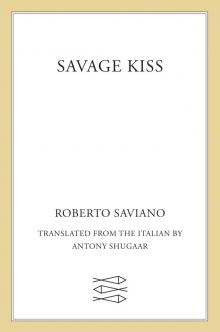 Savage Kiss
Savage Kiss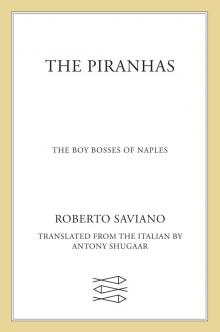 The Piranhas, The Boy Bosses of Naples
The Piranhas, The Boy Bosses of Naples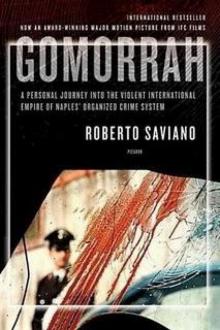 Gomorrah
Gomorrah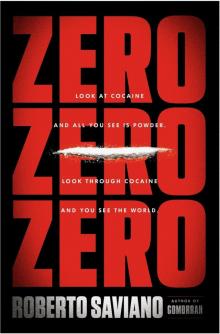 ZeroZeroZero
ZeroZeroZero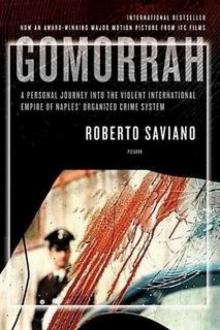 Gomorrah: A Personal Journey into the Violent International Empire of Naples’ Organized Crime System
Gomorrah: A Personal Journey into the Violent International Empire of Naples’ Organized Crime System